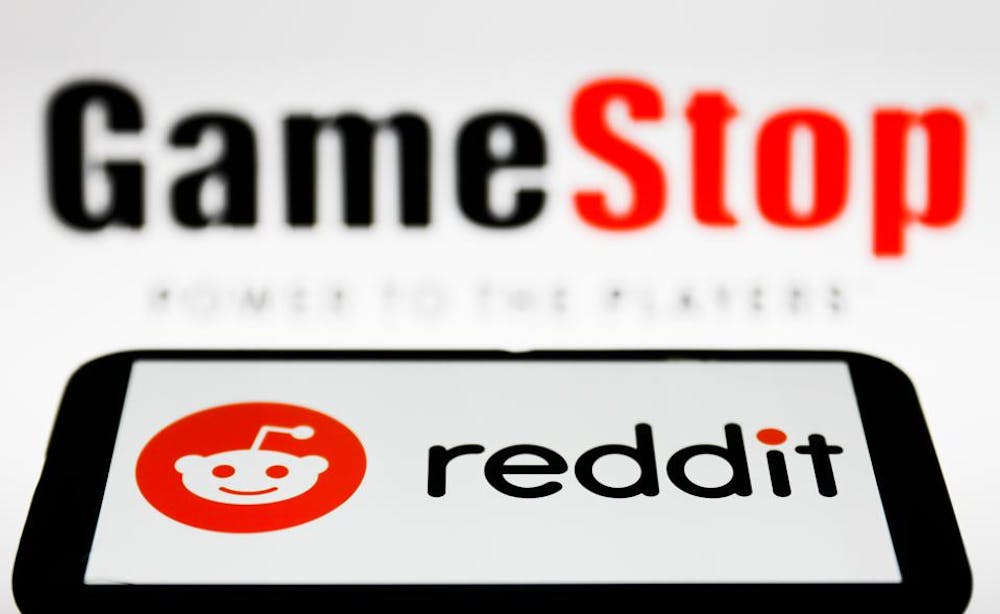Over the past week, the worlds of politics, finance, and social media all collided as retail investors on Reddit exploited a mistake by Hedge Funds causing stock prices in GameStop ($GME) and other companies to soar in value.
The popular video game chain store GameStop has been steadily losing stock value over the past five years due to the increasing role of both downloadable content and online retailers for products, something that has only worsened due to the pandemic. The steady losses, as well as the declines of many other companies such as AMC entertainment have been the target of short selling by many institutional investors.
Short selling, or just shorting, is a type of stock trading where an institution such as a hedge fund borrows a large amount of stock in a company and sells it at its current price with a speculation that the stock price will go down. The institution can then buy back the shares it borrowed at a lower price and profit the difference. Shorting can be a very lucrative way to trade stocks, a famous example can be seen in the movie The Big Short where real life hedge fund manager Michael Burry successfully shorted the real estate market before the 2008 crash, making hundreds of millions for himself and his investors.
While there is nothing legally wrong with shorting stocks, some see it as a less moral way of trading since you are betting on a company to fail and that many Securities and Exchange Commission (SEC) regulations on trading such as certain disclosure requirements do not exist for short selling. Shorting also comes with some large risks, such as if the price of a shorted stock continues to rise, an investor could theoretically lose an infinite amount of money.
That risk was something not foreseen by hedge fund managers in the case of GameStop who had combined to short over 140% of GameStop’s total stock. Many on the internet, especially the reddit forum r/WallStreetBets, noticed these massive short positions on GameStop stock and decided to fight back against the hedge funds. This movement of retail investors to buy stock in GameStop led to a gradual increase in the share price over the months leading into January with the stock price up above $20/share by the second week of January, the price having previously been under $3 earlier in 2020.
The popularity of buying GameStop and the knowledge of the destruction it would cause to many hedge fund’s short positions grew rapidly the week of Jan. 18 as a flood of buyers pushed the price up to almost $100/share by the end of the week. The true moment wouldn’t come until Tuesday, Jan. 26 as the stock price surged above $400/share post market. This short squeeze took advantage of the massive short positions held by hedge funds forcing them to rebuy stock at higher prices and thus driving the price even higher, giving massive profits for many retail investors.
The situation came to a head on Jan. 28 as Robinhood and other trading apps restricted buying on GameStop, AMC, and some other companies only allowing users to sell their shares. This action was seen as market manipulation from Robinhood by entertainment figures such as Barstool Sports founder Dave Portnoy, who was a large advocate of the short squeeze as well as politicians on both sides of the aisle who decried Robinhood depriving its users of free access to the market.
Accusers of malpractice from Robinhood point out its relationship with Citadel Securities, a money maker who processes over 60% of Robinhood’ trades, a privilege it pays Robinhood for in order to track trading data. Citadel was one of two companies that gave a multibillion dollar cash infusion to Melvin Capital, a hedge fund that lost over 50% of its value due to the GameStop surge.
While many believe that Robinhood shut down trading as a way to protect its investors at Citadel and other financial institutions, Robinhood’s official statements show a very different story. Robinhood issued multiple statements explaining how its decision to limit trading was done to protect traders from serious financial losses from volatile stocks like GameStop as well as to protect themselves since large amounts of the funds being traded were borrowed on margin and Robinhood did not have the necessary funds to cover the risk.
Since the events, Robinhood and other brokers have reopened limited trading on GameStop and other companies, but the momentum has already died down significantly with GameStop’s price down over 75% from its high. Members of Congress have promised hearings over Robinhood’s actions and newly confirmed Treasury Secretary Janet Yellen has called a meeting to discuss the regulatory issues of the situation. Yellen previously received $700,000 is speaking fees from Citadel Securities last fall, leading many to believe she holds bias on the issue according to Reuters. White House press secretary Jen Psaki was asked last week about the connection and whether Yellen would recuse herself from any formal investigation and Psaki responded that “the Treasury Secretary is a world-renowned expert on the economy” and “It should not be a surprise to anyone that she was paid to give her expert advice before she came into office.”
Photo courtesy of Jakub Porzycki/NurPhoto via Getty Images












